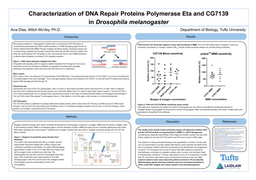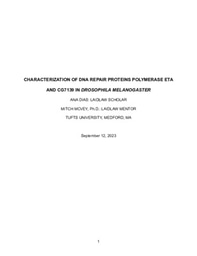Research
The goal of my research is to identify the novel genes involved in DNA damage tolerance in Drosophila. Prior studies suggest that the two main ways that cells respond to DNA damage are by either performing translesion synthesis or template switching. Translesion synthesis is an error-prone DNA repair pathway by which inexact DNA polymerases build the replicated DNA. Template switching, an alternative DNA repair mechanism by which the replicated DNA is formed by more accurate DNA polymerases, is known to be more error-free. Much remains to be learned about template switching, so the genes that I identify will likely be novel.
Translesion synthesis is the primary method of addressing errors in DNA replication in both fly and human cancer cells, while healthy cells in humans typically opt for template switching to repair damaged DNA. I intend to identify genes involved in damage tolerance by inducing DNA damage in flies from a DNA-damaging agent known as methyl methanesulfonate (MMS), which adds methyl groups to DNA bases and can prevent the cells from carrying out their preferred method of repair: translesion synthesis.
To conduct my research, I will be working with flies, breeding them, and using molecular techniques, like polymerase chain reactions (PCR) and DNA sequencing, to copy pieces of DNA and determine the genetic information that is contained in a particular segment of DNA. Using molecular techniques to amplify and characterize the DNA will allow for the identification of the genes responsible for carrying out template switching in Drosophila and the role these genes play in DNA replication.
Some of the flies will ingest a chemical in their food called methyl methanesulfonate (MMS), and the response of the flies after ingesting this chemical is considered when setting up crosses and breeding them. The crosses are designed to reveal the inheritance pattern of these novel genes that are responsible for carrying out template switching when the DNA damage is too severe for translesion synthesis to occur.


Please sign in
If you are a registered user on Laidlaw Scholars Network, please sign in